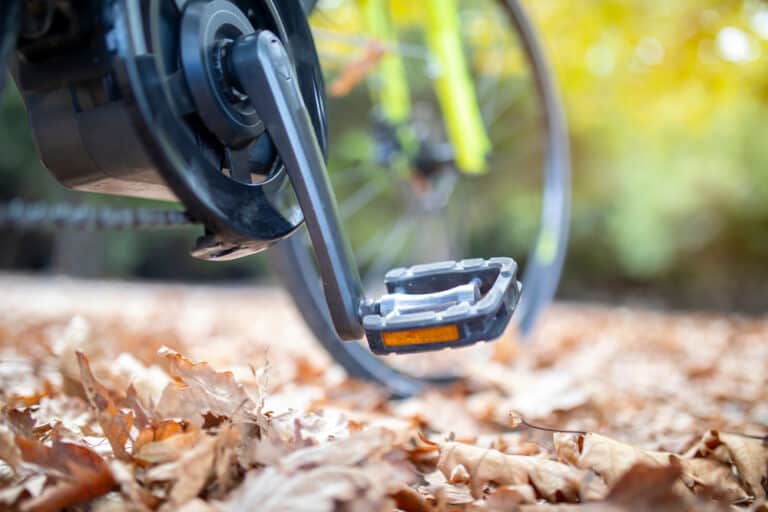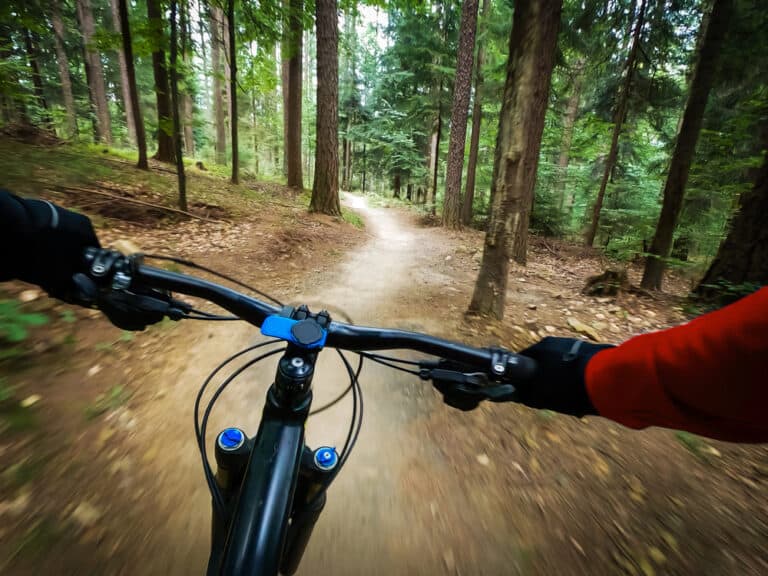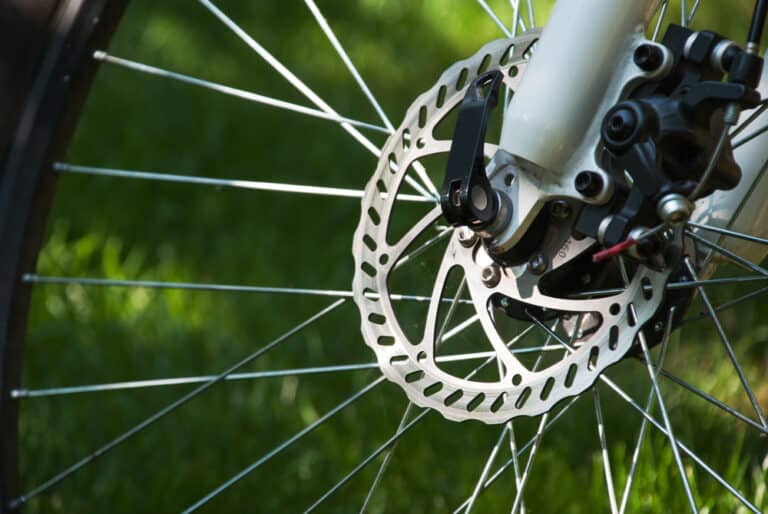Can Road Bikes Go Over Potholes, Rough Rods, Or Bumps?

Riding a bike on well-made, smooth asphalt roads is one thing, and everyone knows that road bikes are made for this, but what happens when the road gets rough? Can road bikes handle rougher roads, potholes, cracks, and bumps? Will a road bike fall apart or suffer from continuous punctures on these roads?
Road bikes can handle rough roads and bumps, but they are easily damaged by deep or sharp potholes. Road bikes are better on rough roads if they have wider tires. Road bikes are unlikely to suffer damage from rough roads, apart from occasional punctures, so long as the rider is careful.
There are several ways to answer this question, simply because there are so many different types of road bikes. However, the fact remains that these bikes are designed to function best on smooth roads, so how well do they fare when things get bumpy? Let’s find out!
Can Road Bikes Handle Rough Roads?
Road bikes are not meant to be used on rough roads, but the reality is that no city in the world has consistently perfect roads. No matter where you live, you are sure to encounter some bumps along the way. How well can a regular road bicycle handle these surfaces?
There is a major misconception that road bikes are completely incapable of handling any bumps in the road whatsoever, but these bikes are tougher and more capable than most people realize.
Road bikes can be ridden on rough roads, and if you are an experienced rider, the bike is unlikely to experience any damage.
However, there are limits to this, as road bikes are not mountain bikes, and they are not meant for very rough terrain. They can be damaged if they are taken on a road surface that is too intense or if they are used carelessly on a rough road.
The most common issue with riding a road bike on a rough surface is punctures due to the tires being pinched in the rim. This occurs when the tires are placed under too much stress or when they experience too much lateral movement, which is common on rough roads.
The way around this is to use a wider tire that can handle these stresses better.
To answer the question directly, you can ride road bikes on rough roads, but the chance of punctures is greater, and the experience goes better if the bike has wider tires.
Can Road Bikes Go Through Potholes?
Riding a road bike on rough roads is one thing, but what happens if you hit a pothole with a road bike?
The answer here is the same for any vehicle: it depends on the size of the pothole.
Any road bike can handle a very minor, very shallow pothole, but if the pothole is deep enough and you hit it hard enough, it is very likely to cause significant damage to the tire and rim and is likely to throw you from the bike.
A pothole with sharp edges can cause punctures, and a pothole that is longer than the tire will stop the rotation of the tire altogether, causing the bike to stop suddenly, which may cause you to fall.
If this occurs, the pothole and sudden stop are likely to put a serious dent in the rim and ruin the tire entirely.
Potholes can be a serious danger for road bikes, but the best way to avoid this problem is to not ride into potholes. If you are paying attention on the road, avoiding potholes should be quite simple, and if there is no way to avoid them, simply stop the bike and carry the bicycle over it.
Potholes are a danger for road bikes, especially those with light rims and thin tires, but they are a minor problem if you simply keep your eyes open and ride cautiously.

Can Road Bikes Be Used On Dirt Roads?
We have established that road bikes can be ridden on rough roads, and there are ways around certain obstacles, but many wonder how far off-road these bicycles can go> can you use a road bike on a dirt road?
You can safely use a road bike on a dirt road, but do not expect the bike to do exceptionally well.
These bike shave skinny tires with very little grip, and they require constant balance input from the rider. This does not equal a capable off-roader.
A road bike can be taken onto gravel roads, but the rider must be exceedingly vigilant and careful, make constant corrections to avoid falling, be very careful with the lines they choose to ride, and they must be ready to repair punctures or replace an entire tire along the way.
It is possible for any bike to be ridden on any road, but the unfortunate reality is that taking a road bike onto dirt is likely to result in more falls and damage to the bike, depending on how well you can ride.
Do Bumpy Roads Damage Road Bikes?
Modern road bikes are exceptionally well made from materials that are designed to take a beating without sustaining much damage at all.
Lightweight but durable materials combined with the right amount of flexibility, shock absorption, and balance means that most good road bikes can handle the bumpiest of roads without sustaining any damage at all.
A well-made road bike constructed with good materials and ridden by an experienced cyclist can handle almost any road out there.
However, a bike that is made from poor materials and ridden by someone who does not know what they are doing can be damaged by a road that is sufficiently bumpy.
However, if you take it easy, manage your speed well, watch where you are riding, and try to avoid the worst of the bumps, you and your bike should be fine on bumpy roads, apart from a few unavoidable punctures.
Conclusion
Road bikes are not meant for excessively bumpy or rough roads, but they can handle them when they have to. A well-made road bike can ride on anything short of a mountain and can handle almost anything an asphalt road has to throw at it.
If you are taking your road bike onto some tougher terrain for the widest tires your bike can handle, and be sure to watch your speed. If you keep it slow on wider tires, you should have no problems at all.
References
- https://www.jk-forum.com/forums/modified-jk-tech-2/manual-auto-swap-342429/
- https://bikeryou.com/can-road-bikes-handle-bumps-potholes-rough-roads/
- https://bicycles.stackexchange.com/questions/14858/are-road-bikes-durable-for-use-on-roads-full-of-cracks-and-potholes
- https://www.quora.com/How-off-road-can-road-bikes-go






